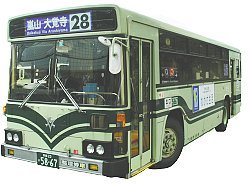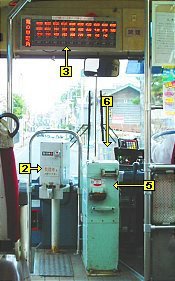BUS

Kyoto City Bus
In Tokyo, Osaka and some other large cities, buses serve as secondary means of public transportation, complementing the train and subway networks. In cities with less dense train networks like Kyoto, buses are the main means of public transportation.
Buses also serve smaller towns, the countryside and national parks. Major cities are, furthermore, linked by highway and long distance buses.
How to use a bus
Using buses in Japan can be intimidating to foreign tourists, because there are usually few English displays and announcements, and there are different systems of using buses depending on the company. Below is a description of the most common system, followed by notes about prominent exceptions:
| 1) Enter the bus through the back door (or front door if there is only one door). 2) When entering, pick up a ticket from a small machine. A number is printed on the ticket, which you will later use to determine your fare. 3) A display above the driver shows the next stop and the fares for that stop in Yen. To determine your fare, match the number on your ticket with the number and fare on the display. 4) When your stop is approaching, press one of the buttons on the wall to signal the driver that you wish to get off at the next stop. 5) If you do not have the exact fare, use the changing machine to get small coins. 6) When getting off, put your ticket and the exact fare into the box next to the driver. |  |
In many cities or city centers, for example in central Kyoto, a flat fare applies, i.e. you always pay the same price regardless of how far you travel. This means that you do not have to worry about steps 2) and 3) in the above description.
Of course, there are a few exceptions to the above outlined system. The most prominent exception are the Tokyo Metropolitan Buses, where you are supposed to enter through the front door, pay a flat fare when entering, and exit through the rear door.
No comments:
Post a Comment